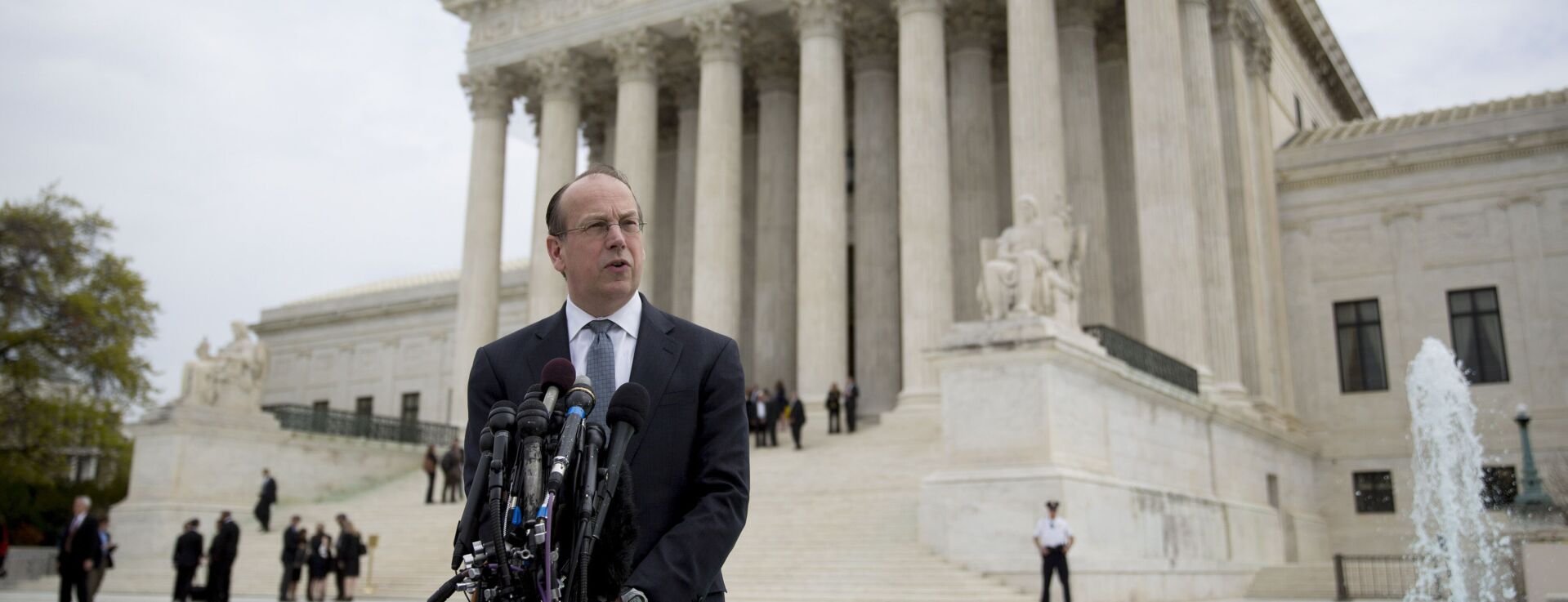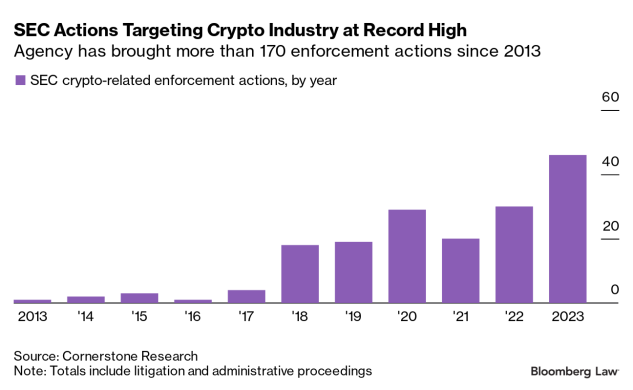The cryptocurrency industry, feeling the squeeze from securities regulators suing in New York, is going on offense in Texas, with backing from venture capital giants and US Supreme Court veterans.
At least twice in recent weeks, small crypto businesses wary of enforcement actions have teamed up with well-connected trade groups to sue the Securities and Exchange Commission, challenging how the agency polices their industry.
The lawsuits—filed in a circuit with a reputation for doubting agency powers, and piloted by the likes of former US Solicitor General Paul Clement—represent the crypto industry’s evolving legal strategy in response to the SEC’s crackdown.
To legal observers, the playbook seems clear: create a split among circuit courts and get the attention of the nation’s highest court.
“This absolutely is them going on the offensive,” said Todd Phillips, a professor of law in the Robinson College of Business at Georgia State University who has filed briefs supporting certain SEC arguments in crypto cases. “This absolutely is them preparing a case for the Supreme Court.”
One of the industry groups, the Crypto Freedom Alliance of Texas, launched in September with deep-pocketed backers. Andreessen Horowitz’s a16z crypto,
Crypto Crackdown
The SEC has been aggressive targeting the crypto industry in recent years. The agency’s chair, Gary Gensler, views most digital assets as securities that are subject to SEC rules.
Through the end of 2023, the agency brought more than 170 crypto-related enforcement actions, collecting almost $2.9 billion in penalties and other fines, according to a Cornerstone Research report. Almost three-quarters of those cases were brought in the past four years.
The SEC’s actions include high-profile lawsuits against Coinbase and Binance Holdings Ltd., accusing them of illegally operating unregistered securities exchanges. The agency has also sued companies like Ripple Labs Inc. that allegedly sold unregistered securities.
Over one-third of the SEC’s lawsuits have been filed in the Southern District of New York, the most of any court, according to Cornerstone Research’s report. The agency has notched some wins in those cases, including last week when a judge refused to dismiss its suit against Coinbase.
Read More: SEC Suit Against Coinbase Can Go Forward, Judge Rules
By filing lawsuits in Texas, where the SEC typically hasn’t brought crypto actions, the industry appears to be trying to flip that script.
“Until now, the SEC was driving the development of the case law to some degree by being strategic in determining which cases to bring, on which facts patterns, and in which jurisdictions,” said Kayvan Sadeghi, who leads the blockchain practice at Jenner & Block LLP. “These challenges are trying to take back some of that initiative.”
Instead of waiting for the regulator’s next move, the crypto plaintiffs are “trying to get law created that is in the industry’s favor,” said Linklaters LLP attorney Joshua Ashley Klayman, the firm’s US head of fintech and head of blockchain and digital assets.
“In many ways, this is a bit of 3D chess,” Klayman said.
‘Sitting Ducks’
The crypto industry fired its opening salvo in the Lone Star State in a Feb. 21 suit from CFAT, the recently formed industry trade group, and Lejilex, which has plans to launch a crypto exchange. The plaintiffs argued that secondary sales of digital assets aren’t securities, putting them outside the SEC’s authority.
“We expect that more strategic lawsuits like this one will be filed before long,” Jake Chervinsky, the chief legal officer of crypto venture capital firm Variant, wrote on LinkedIn after the lawsuit was filed in Texas’ Northern District.
The second suit came last month, when industry group the DeFi Education Fund joined with Beba LLC in a case against the SEC. Beba makes luggage and has airdropped digital tokens as part of a marketing strategy. It wants a ruling that the airdrops weren’t a securities transaction.
DEF and Beba, which filed their lawsuit in the Western District of Texas, are also challenging the SEC’s “unwritten policy” on crypto rules as a violation of the Administrative Procedure Act, arguing the agency should’ve gone through a formal rulemaking.
“We are tired of being sitting ducks,” Amanda Tuminelli, DEF’s chief legal officer, said by phone.
Chervinsky, Variant’s chief legal officer, also sits on DEF’s steering committee.
There are other recent efforts to take the fight to the SEC. Coinbase sued the agency in the Philadelphia-based Third Circuit late last year after the SEC refused the exchange’s request to make new rules around trading digital assets.
But the industry’s lawsuits brought in Texas, before the SEC takes any action, highlight a new approach.
Ideally, Tuminelli said, there would be legislative solutions on crypto rules. “In the meantime, we think that we need to apply to the court, and this is the clearest and most efficient way to get a court order,” she said.
Eye on SCOTUS
The parties in both Texas cases appear to be positioning themselves for the long game.
CFAT and Lejilex’s legal team includes Clement, the former solicitor general who is known for taking high-profile appellate and Supreme Court cases.
DEF and Beba are represented by former Clarence Thomas law clerk Cameron Norris, an attorney at Consovoy McCarthy PLLC. The firm has racked up recent wins at the Supreme Court, including over race-conscious admissions programs at universities.
The groups went to trial courts in the Fifth Circuit, a place viewed as business-friendly and skeptical of administrative agencies’ powers. When it comes to the SEC, the appeals court recently struck down a rule related to stock buybacks and rejected the use of in-house judges. Some Fifth Circuit judges have also questioned the agency’s use of “gag orders” in settlements.
Tuminelli said DEF’s relationship with Beba formed organically after meeting one of the company’s founders at a crypto conference. That the small retailer is based in Waco made it “an easy call” about where to file the lawsuit, she said.
To court watchers, the potential implications are clear.
Trial judges in New York have sided with the SEC on some key issues, including rejecting arguments that the regulation of crypto implicates the Supreme Court’s major questions doctrine, which says agencies must have clear authorization from Congress for an action with significant economic or political consequences.
In the Coinbase case, a federal judge in Manhattan on March 27 said crypto transactions aren’t categorically excluded from being securities just because they took place on a secondary market.
“Although courts in the Second Circuit have not appeared to be receptive to the major questions doctrine in crypto cases, courts in the Fifth Circuit may well have a different perspective and look at the doctrine with greater interest,” said Helen Gugel, a litigation and enforcement partner at Ropes & Gray LLP.
Similarly, Phillips said it wouldn’t be surprising if the Fifth Circuit reached a different conclusion about whether securities laws apply to cryptocurrency that’s listed on an exchange, creating the potential for a split among appeals courts. He called it an “ingenious” play by the industry.
If appeals courts go in different directions on those issues, the Supreme Court “basically has to take the case because you can’t have some tokens be securities in some parts of the country, and some be not securities in other parts of the country,” Phillips said.
Read More: Crypto Firms Take SEC Fight to Texas, With Eye on Supreme Court
Disclaimer:The information provided on this website does not constitute investment advice, financial advice, trading advice, or any other sort of advice and you should not treat any of the website’s content as such. NewsOfBitcoin.com does not recommend that any cryptocurrency should be bought, sold, or held by you. Do conduct your own due diligence and consult your financial advisor before making any investment decisions.



